This website uses cookies so that we can provide you with the best user experience possible. Cookie information is stored in your browser and performs functions such as recognising you when you return to our website and helping our team to understand which sections of the website you find most interesting and useful.
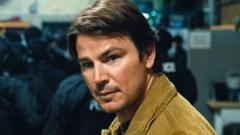
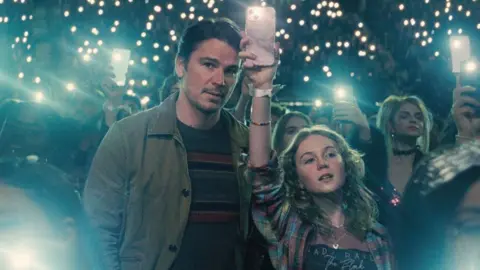 Warner Bros
Warner BrosA man takes his daughter to a pop concert, only to discover when he arrives that the whole thing is a sting operation set up by the FBI to try and entrap a dangerous criminal.
Although the concert is real, the venue is swarming with police and special agents, watching the audience like hawks in the hope of finally catching the fugitive they've been chasing for months.
It sounds like something from a movie - and that's exactly what it is. Trap is the latest release from M. Night Shyamalan, a director famous for high-concept films with big twists such as The Sixth Sense.
But the events of the film are actually inspired by a real-life case from four decades ago, known as Operation Flagship.
The 1985 sting saw more than 100 criminals arrested after they were lured to a fake TV station thinking they had won free NFL tickets.
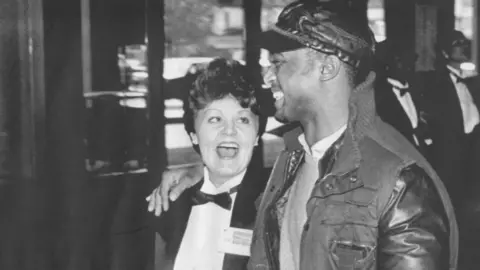 Getty Images
Getty ImagesAround 3,000 fugitives were offered complimentary tickets to watch a Washington Redskins game, and were told they'd also have the chance to win an all-expenses-paid trip to the Super Bowl.
But when nearly 120 of them turned up at the headquarters of a fictional TV company to claim their prize, they were arrested. It is an extraordinary story, which provided the film's stimulus.
"I heard about it when I was a kid and I thought it was totally absurdist, that this actually happened," Shyamalan tells BBC News.
"It was something that was in my head a lot when it happened... This was real-life criminals, FBI and police. They dressed up as cheerleaders and mascots and were dancing around with them and goofing around with them."
He notes: "Probably today they couldn't do anything like this, but back in those days they were literally partying with them.
"They were like 'come on in the room!' and then checked their names and made sure it was the right people, and got around them and said 'you're all under arrest'."
What was Operation Flagship?
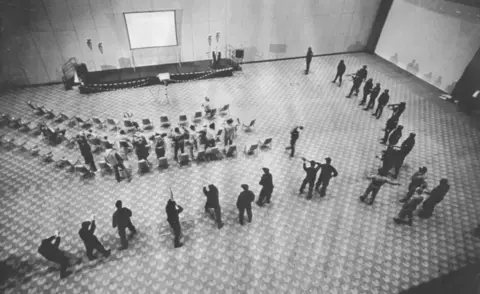 Getty Images
Getty ImagesThe sting took place on 15 December 1985, when Washington Redskins were due to play the Cincinnati Bengals.
The fugitives who had been targeted by the US Marshals service were told they had been randomly selected from a list of Washington DC residents to receive two free tickets.
The game was due to start at 1pm, but the apparent competition winners were invited to show up in the morning to receive their tickets. They would be transported by bus to and from the game that afternoon. Or so they were told.
"We sent out invitations to a little under 3,000 fugitives, to a brunch at the Washington Convention Centre," recalled Toby Roche in a 2016 documentary about the sting.
Roche was the chief deputy of the US Marshals at the time - but for the purposes of Operation Flagship, he was posing as an event usher.
"My role were to make sure that the fugitives who turned up were in fact fugitives," he said, explaining that the agents had code words for the level of criminals.
"A 'confirmed winner' was someone who was wanted. A 'double winner' was a dangerous person; someone who'd had aggravated assault, murder or robbery."
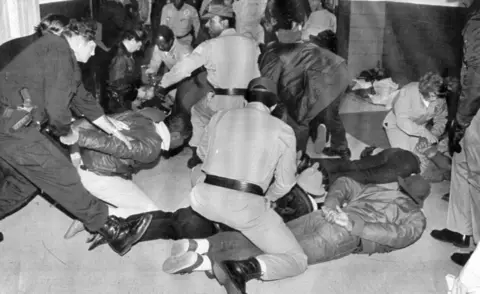 Getty Images
Getty ImagesHis colleague Bob Leschorn, the chief deputy of enforcement in the US Marshals, was posing as the CEO of the fictional US cable TV network - Flagship International Sports Television.
"We had 119 extremely lucky individuals, who, by chance, were all wanted on criminal warrants," Leschorn recalled with a smile.
But instead of heading to the game, he said, "they won a trip to the DC jail".
The agents used reverse psychology to help coax as many of the criminals to the event as possible.
The winners were told over the phone that if they didn't redeem their tickets and bring their ID, the prize would be given to someone else.
"And that really [made them say], 'wait a minute, you're not going to give my Redskin tickets away, I'll be there'," Leschorn explained.
With the stage set, the US Marshals ensured everything surrounding the fake TV station looked visually authentic.
Marshals were dressed in tuxedos and told to smile politely at the criminals they usually chase. Several of the female officers were even enlisted to be cheerleaders.
When the fugitives arrived, the cheerleaders would be physically affectionate with them, putting their arms around them and so on. In reality, they were patting them down to make sure they weren't carrying weapons.
Not that there was much risk of that, noted Howard Safir, associate director of operations at the US Marshals, who was posing as marketing expert for the day.
"Sting operations are a safe way to arrest fugitives," he pointed out. "They usually will not come with weapons, their minds are diverted, they're in a festive mood."
'Hook, line and sinker'
Once they had arrived and confirmed their identities, the fugitives were taken in groups of about 15 to a hall with a stage.
"We've got a big surprise for you," said the speaker. "Everybody's under arrest."
The criminals were surrounded, and escorted out in handcuffs. In total, 101 arrests were made.
"It was party time," US marshal for the District of Columbia Herbert M. Rutherford told the Associated Press afterwards. "And they fell for it hook, line and sinker."
Some of the fugitives struggled to comprehend what had happened, even after they'd been caught.
As the buses carrying the fugitives were pulling away, one asked: "Do we still get to go to the game?"
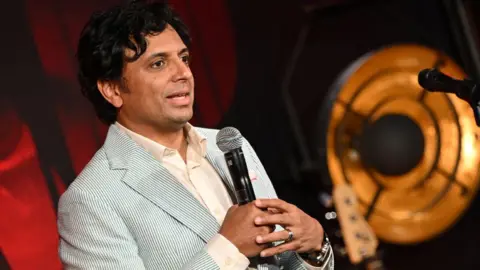 Warner Bros
Warner BrosTrap, released in the UK this weekend, is not the story of Operation Flagship - the film is set in the world of music rather than sport - but its premise shares the same DNA.
The singer performing at the concert which provides the film's backdrop is Lady Raven, played by Shyamalan's own daughter Saleka.
Although a new story, Shyamalan remembered Operation Flagship as he began formulating Trap, saying he was attracted to "the absurdity of it against the reality of it" .
"[The authorities] used the absurdity against them because they lowered their guard, which I thought was quite brilliant," he tells the BBC.
"So it just stuck with me, and I guess when Saleka and I were thinking about a movie at a concert, I wondered, why would this person not be able to get out, and how can I keep them there?"
He said Trap is spiritually similar to the real-life case, even if the film is not a direct re-telling.
"It was just the spirit of the idea of being trapped in the absurdity of it," the director explains. "I thought it would be super funny, because when you see the footage of [Operation Flagship] it's hilarious."
Mixed reviews
Oddly, the film wasn't screened for critics prior to its US release last week - something which usually is a signal that a studio knows their movie is a dud.
However, some critics were able to write reviews once the film had opened to the public.
Lindsey Bahr of the Associated Press described it as a "popcorn movie" which is "ultimately a pretty fun time at the theatre".
But, she added, the film is somewhat "underbaked, a ridiculous ride that’s not going to get under your skin or provide for a lot of discussion fodder afterwards".
The film didn't impress Variety's Owen Gleiberman, who said Trap was a "thriller where each twist is more contrived than the last", while the Guardian's Benjamin Lee branded the film "a mess".
The Wrap's William Bibbiani was more measured, writing: "Trap doesn’t have the depth of Shyamalan’s most important films or the theatricality of his most memorably weird experiments.
"But it’s one of his best thrillers. A tightly wound, devilishly fun, mean little film that dares us to consider the serial killer genre from new angles."



 Africana55 Radio
Africana55 Radio 

